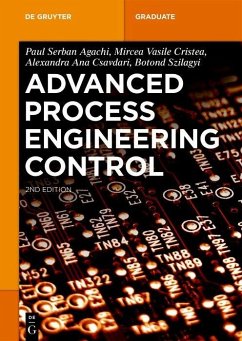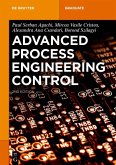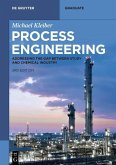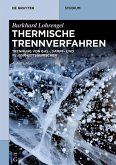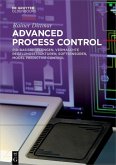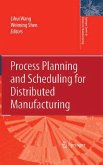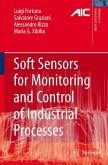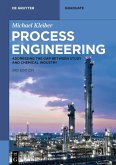As a mature topic in chemical engineering, the book provides methods, problems and tools used in process control engineering. It discusses: process knowledge, sensor system technology, actuators, communication technology, and logistics, design and construction of control systems and their operation. The knowledge goes beyond the traditional process engineering field by applying the same principles, to biomedical processes, energy production and management of environmental issues. The book explains all the determinations in the 'chemical systems' or 'process systems', starting from the beginning of the processes, going through the intricate interdependency of the process stages, analyzing the hardware components of a control system and ending with the design of an appropriate control system for a process parameter or a whole process. The book is first addressed to the students and graduates of the departments of Chemical or Process Engineering. Second, to the chemical or process engineers in all industries or research and development centers, because they will notice the resemblance in approach from the system and control point of view, between different fields which might seem far from each other, but share the same control philosophy.
_ Professor Paul Serban Agachi graduated in Control Engineering at the Politehnica University of Bucharest and obtained his Ph.D. in Chemical Engineering from the University for Petroleum & Gas in Ploiesti, Romania. He is currently teaching process control at the Department of Chemical Engineering of Babes-Bolyai University, Cluj-Napoca. He was visiting associate at California Institute of Technology, invited professor at Eötvös Lorand University, UNESCO Higher Education consultant, member of the Academy of Technical Sciences of Romania, chair of CAPE Forum 2005, and co-chair of ESCAPE 17. He has published 7 books and 85 scientific papers.
_ Cristea Vasile Mircea graduated the Faculty of Electrotechnics, Romania, with specialization on process control and computer science and holds a Ph.D. degree in process control. After 8 years spent in industry he is at present Associate Professor at Babes-Bolyai University, Cluj-Napoca; his interests lie in systems theory, chemical process control, advanced process control, data acquisition and control, linear and nonlinear model based predictive control, and fuzzy control. He was director of CNCSIS Projects and has published 3 books as well as over 55 scientific papers.
_ Dr. Alexandra Csavdari is a physical chemist at Babes-Bolyai University, with the main research focus on chemicals kinetics and mechanistic studies of various reactions in homogeneous and heterogeneous phase as well as kinetic method of analysis of polluntants in aqueous solutions.
_ Professor Paul Serban Agachi graduated in Control Engineering at the Politehnica University of Bucharest and obtained his Ph.D. in Chemical Engineering from the University for Petroleum & Gas in Ploiesti, Romania. He is currently teaching process control at the Department of Chemical Engineering of Babes-Bolyai University, Cluj-Napoca. He was visiting associate at California Institute of Technology, invited professor at Eötvös Lorand University, UNESCO Higher Education consultant, member of the Academy of Technical Sciences of Romania, chair of CAPE Forum 2005, and co-chair of ESCAPE 17. He has published 7 books and 85 scientific papers.
_ Cristea Vasile Mircea graduated the Faculty of Electrotechnics, Romania, with specialization on process control and computer science and holds a Ph.D. degree in process control. After 8 years spent in industry he is at present Associate Professor at Babes-Bolyai University, Cluj-Napoca; his interests lie in systems theory, chemical process control, advanced process control, data acquisition and control, linear and nonlinear model based predictive control, and fuzzy control. He was director of CNCSIS Projects and has published 3 books as well as over 55 scientific papers.
_ Dr. Alexandra Csavdari is a physical chemist at Babes-Bolyai University, with the main research focus on chemicals kinetics and mechanistic studies of various reactions in homogeneous and heterogeneous phase as well as kinetic method of analysis of polluntants in aqueous solutions.
Dieser Download kann aus rechtlichen Gründen nur mit Rechnungsadresse in A, B, BG, CY, CZ, D, DK, EW, E, FIN, F, GR, HR, H, IRL, I, LT, L, LR, M, NL, PL, P, R, S, SLO, SK ausgeliefert werden.
"Unfortunately, there are not so many textbooks on control of process engineering apparatus [...] Therefore, this book is a very good contribution to this subject. Numerous control schemes and examples explain the methods presented."
Prof. Dr.-Ing. Robert Haber, Cologne University of Technology
"Es gibt leider nicht so viele Lehrbücher über die Regelung von verfahrenstechnischen Apparaten [...] Daher ist dieses Buch ein sehr guter Beitrag zu diesem Thema. Zahlreiche Regelungsschemen und Beispiele erläutern die präsentierten Methoden."
Prof. Dr.-Ing. Robert Haber, Technische Hochschule Köln
Prof. Dr.-Ing. Robert Haber, Cologne University of Technology
"Es gibt leider nicht so viele Lehrbücher über die Regelung von verfahrenstechnischen Apparaten [...] Daher ist dieses Buch ein sehr guter Beitrag zu diesem Thema. Zahlreiche Regelungsschemen und Beispiele erläutern die präsentierten Methoden."
Prof. Dr.-Ing. Robert Haber, Technische Hochschule Köln

